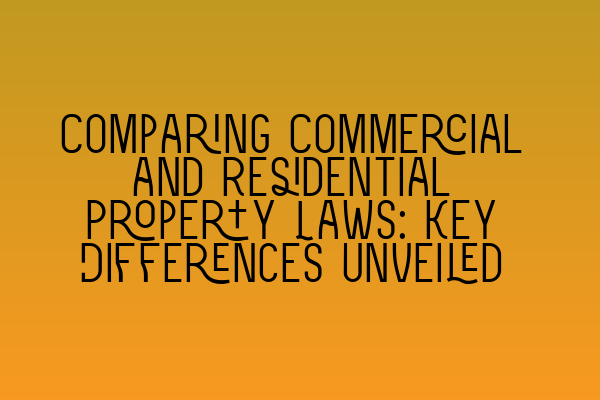Comparing Commercial and Residential Property Laws: Key Differences Unveiled
When it comes to property law, there are significant differences between commercial and residential properties. Whether you are a buyer, seller, landlord, or tenant, understanding these differences is crucial to ensuring your rights and obligations are protected. In this article, we will explore the key distinctions between commercial and residential property laws and how they can impact your property dealings.
1. Ownership and Use:
One of the fundamental differences between commercial and residential properties lies in their intended use. Commercial properties are primarily used for business purposes, such as offices, retail spaces, restaurants, or warehouses. On the other hand, residential properties are designed for human habitation, whether as single-family homes, apartments, or condominiums.
2. Legal Framework:
Commercial and residential properties are subject to different legal frameworks. Commercial property laws are typically governed by commercial real estate statutes and regulations, while residential property laws are governed by private property laws and landlord-tenant laws. It is essential to understand the specific regulations that apply to your property type to ensure compliance.
3. Lease Agreements:
Lease agreements for commercial and residential properties differ in several key aspects. Commercial leases are generally longer-term and more complex, as they often involve negotiations of terms related to rent structure, maintenance responsibilities, property modifications, and insurance. Residential leases, on the other hand, tend to be simpler and typically follow standardized templates with predetermined terms.
4. Property Valuation:
Valuing commercial and residential properties also follows different approaches. Commercial properties are usually valued based on income potential. The income generated from the property, such as rent from tenants, is a crucial factor in determining its value. Residential properties, on the other hand, are typically valued primarily based on recent comparable sales in the area or by using an appraiser’s expert opinion.
5. Financing Options:
Financing commercial and residential properties can vary significantly. Commercial mortgages often require more extensive documentation and financial analysis, and lenders may consider factors such as the property’s income potential, the borrower’s business plan, and their creditworthiness. Residential mortgages, on the other hand, typically focus more on the borrower’s personal financial situation, including their income, credit score, and debt-to-income ratio.
6. Landlord-Tenant Rights:
Landlord-tenant laws differ between commercial and residential properties. Commercial tenants usually have fewer statutory protections compared to residential tenants. Commercial leases often give landlords more freedom in setting terms and conditions, including rent increases and maintenance responsibilities. By contrast, residential tenants enjoy more extensive legal protections, such as restrictions on rent increases, eviction procedures, and habitability standards.
7. Property Use Restrictions:
Commercial properties may be subject to zoning laws and other regulations that restrict their use. These restrictions ensure that commercial properties are used in a manner that aligns with the community’s development plan and preserves its character. Residential properties are also subject to zoning laws but are typically more flexible in terms of use, allowing for various types of dwelling units within designated residential zones.
In conclusion, understanding the differences between commercial and residential property laws is crucial for anyone involved in property transactions. From ownership and use to lease agreements and financing options, each property type has its unique legal framework and considerations. Whether you are a buyer, seller, landlord, or tenant, being aware of these distinctions will help you navigate the legal landscape more effectively and make informed decisions.
If you are preparing for the SQE 1 or SQE 2 exams and would like to enhance your knowledge of property law, we offer comprehensive preparation courses at SQE Property Law & Land Law. Additionally, to test your understanding and practice your skills, we have SQE 1 practice exam questions and SQE 1 practice mocks available for you. Stay on top of the latest exam dates with our SRA SQE Exam Dates guide.
Remember, property transactions can be complex, and it is always wise to seek professional legal advice to ensure your rights are protected. At SQE Property Law & Land Law, our team of expert solicitors can assist you with all aspects of commercial and residential property law. Contact us today to learn more and schedule a consultation.
Additional Resources:
– SQE 1 Practice Exam Questions
– SQE 1 Practice Mocks FLK1 FLK2
– SQE 2 Preparation Courses
– SQE 1 Preparation Courses
– SRA SQE Exam Dates
